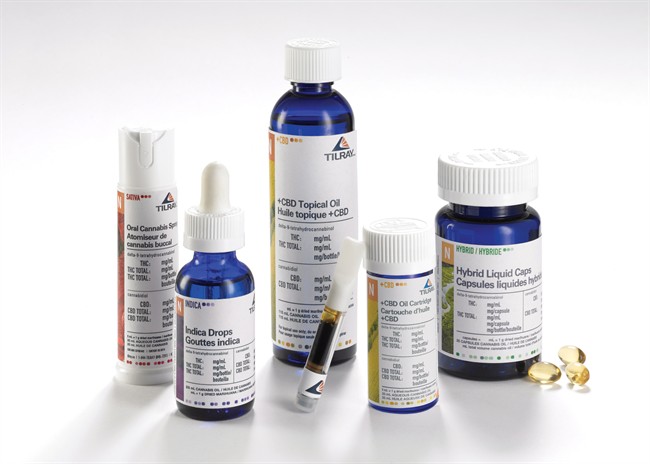A number of Canada’s medical marijuana growers are poised to release cannabis oils for authorized patients who don’t want to smoke or vaporize the dried herb to relieve their symptoms.

In July, Health Canada gave growers the green light to begin producing the plant-based extracts, which are expected to be approved for sale in the coming months.
About a dozen of the country’s 25 medicinal pot producers have sought expanded licences to produce and market cannabis oils and/or fresh marijuana buds and leaves under the updated federal regulations. Among them are Ontario companies Tweed and Bedrocan Canada Inc., and B.C.’s Tilray.
Tilray announced Monday that it has 20 cannabis extract products awaiting Health Canada approval, including oils in liquid form, gel caps and a topical preparation for certain skin conditions.
READ MORE: Health Canada now allowing medical marijuana producers to sell cannabis oil
“We really felt it was important to let patients and the general public, physicians and researchers know about these products ahead of time,” Philippe Lucas, the company’s vice-president of research and services, said from Nanaimo, B.C.
“We know there’s going to be a lot of questions about the products, the first time that these kinds of extract products will be legally available in Canada.”
Lucas said some patients and doctors aren’t keen about the idea of having to smoke or vaporize dried marijuana. Cannabis extracts allow the drug to be ingested — and more discreetly.
Patients who have been authorized by their doctors to purchase dried medical marijuana to treat such conditions as chronic pain, multiple sclerosis symptoms or epilepsy will not need a new prescription to access cannabis oils, he said.
“There’s an equivalency factor that we’ve put into these and so there will be an equivalency, for example, of the number of gel caps or the amount of oil you’re allowed to order, based on your daily and monthly limits.

Get weekly health news
“So any Canadian who’s authorized to use medical cannabis right now would be able to access these,” said Lucas, noting that the oils will be delivered by mail or courier in the same way the dried herb is currently shipped.
Prices for the oil extracts, he said, should not be substantially higher than the $4 to $14 per gram for the dried products.
READ MORE: Medical pot for chronic pain appears safe: study
Bruce Linton, chairman and CEO of the recently merged Bedrocan and Tweed, said the company initially plans to release two or three cannabis oil products, which could be scaled up to 10 or more, depending on patient demand.
“There are different types of oils,” Linton said from the Tweed plant in Smiths Falls, Ont., southwest of Ottawa. “The combination of ingredients is expected to have a similar effect in its oil form as it does in its flower form.”
For instance, an oil could include a combination of marijuana strains, while another could be a purified single strain with a specific effect, such as helping a person with chronic pain to sleep.
“So each of the venues has their own distinct strains, which have their own distinct applications and will become their own distinct oils,” he said of the Bedrocan and Tweed growing facilities.
As well, some oils produced by the various growers will have different concentrations of the weed’s main medicinal ingredients: THC (tetrahydrocannabinol), the psychoactive agent that provides marijuana’s high, and non-psychoactive CBD (cannabidiol), which is being used by some patients to control seizures.
Lucas of Tilray said some parents have been going through the laborious process of making their own cannabis oil from dried marijuana to give to their children with epilepsy or other seizure disorders that are resistant to or poorly controlled by standard pharmaceuticals. Typically these oils come from strains high in CBD.
Jennifer Ayotte of Oshawa, Ont., said having cannabis in oil form would be a major benefit in treating her 23-year-old daughter Stephanie, who suffers intractable seizures from Lennox-Gastaut syndrome.
Currently Ayotte makes brownies containing dried marijuana that her daughter can eat. One brownie can be divided into many small portions and ingested throughout the day to control her seizures.
The medicinal pot has made a big difference for Stephanie, who had been having up to a dozen seizures a day and had fallen down stairs and broken her leg as a result.
Traditional anticonvulsive drugs either didn’t work or provided little improvement, and they also had side-effects “that were just awful,” said Ayotte, explaining that some made her daughter so psychotic that she tried to jump out of the car on Highway 401 and kicked in one of the vehicle’s doors.
While ingesting marijuana has reduced Stephanie’s seizures by at least 90 per cent, the high sugar content needed to make them even remotely palatable has led to unwanted weight gain in her daughter, who also has severe cognitive impairment.
“So having an oral would be tremendous,” her mother said.
“Certainly for us and for other people who are caring for her, it will make it a lot easier. So when she is out or we’re in a restaurant and she needs to have it, instead of having a brownie, it can be put into the food that she’s eating.”
A Health Canada spokesman said once a grower has received a supplemental licence to produce cannabis oils, the company is permitted to get production up and running, but is not yet allowed to sell the products.
“Health Canada officials will conduct a formal inspection of their facility to determine if the licensed producer meets the requirements for sale,” Sean Upton said by email.
“When all requirements are met, including analytical testing to ensure compliance with the conditions of the supplemental licence and the requirements for good production practices under the Marihuana for Medical Purposes Regulation, Health Canada will amend the supplemental licence to include the activity of sale.”







Comments